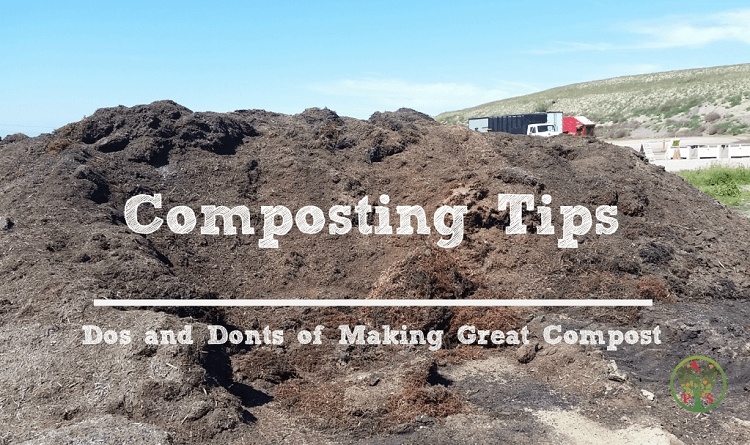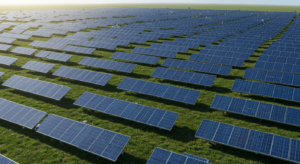23 Composting Tips |
Composting Guide Dos and Don’ts
Here’s a few composting tips, whether you are a seasoned gardener or just starting out. These composting tips will help make great compost from your compost pile.
Composting Tips – Composting Dos
- Build a compost pile that is at a minimum of 3 feet by 3 feet in size. A few DIY Compost bin styles will help guide you on the right compost bin for you.
- Elevate your compost bin on a palette to keep it well aerated on the bottom, and allow for good drainage.
- The best compost is made by the hot composting method. Using this method all the materials are added at once and you don’t add to the pile. If you have kitchen scraps, worm composting is a better bet.
- To keep unwanted seeds out of your worm compost, heat the kitchen scraps in a microwave first to kill all seeds.
- Green materials can be stored and used in the compost pile at a later date if you dry them out first. If you store them without drying them out they become moldy and unusable. This just one composting tip on how to compost.
- Store composting materials in garbage cans with lids keeps the composting area neat and tidy. It also helps in measuring out your volume of compost materials when you are building the compost pile. Most experienced gardeners love this composting tip – try it!
- Always keep your compost moist. Pre-wet all materials before adding it to the compost pile. This composting tip will keep the composting microbes happy. When a compost pile dries out the composting process shuts down and the materials are not readily decomposed. Target 40% moisture content. Particularly pay attention to the outside of your compost pile since this tends to dry out quickly. Leaves are particularly dry.
- Keep your compost pile aerated. Following this composting tip, this means you will need to turn your compost pile since all the hard working compost microbes will use up the oxygen and your pile will go anaerobic in the middle. Anaerobic conditions foster plant diseases – so that would be bad if you added anaerobic compost to your garden! Turn your compost.
- If you live in an area where you have lots of critters such as raccoons, mice, rats or even bears, then a great composting tip is to leave all meat scraps as well as kitchen scraps out of your compost pile. This will keep the unwanted critters from foraging in your compost.
- To keep the compost in a neat and tidy area, use a compost bin that has a lot of air circulation. Avoid compost tumblers since they do not aerate well and do not make great compost.
- Add compost starter and other micronutrients when building the compost pile. Micronutrients are often limiting in soil and by adding it to the compost it will be well incorporated when you are ready to spread it on the garden. Most experienced growers keep this composting tip a secret!
- Make compost that is specific to the type of plant you are growing. Compost for trees and shrubs will use a different recipe than compost for most vegetables or lawns. Learn more about making high quality compost and other compost tips in our premium online compost class. Enroll today and take your garden to the next level.
- Compost should be applied in the fall, after you have harvested the food in your garden. Compost becomes well incorporated naturally by soil organisms throughout the fall and through to the spring.
Composting Tips – Composting Don’ts
- Your compost pile should be in an upland, dry area, not near a water source. Any leachate coming from the compost pile may negatively affect the water quality in nearby streams and ponds.
- A compost pile built on a slope can cause you big headaches, because a large compost pile can tip over and make a mess!
- Composting made with animal scraps is possible, but it will heat up your pile considerably and you will need to turn the compost frequently. An unturned compost pile with a lot of animal scraps can go anaerobic and anaerobic conditions foster the development of plant diseases. You don’t want that type of compost in your garden or around your trees and shrubs.
- A compost pile that is too wet can go anaerobic. Don’t overwater the compost. This composting tip alone will help you make high quality compost. Composting material should have an overall moisture content of about 40%. Our article on how to compost covers this and other details.
- Invasive species are a huge problem. We don’t want to spread species that are overly aggressive and can take over. Unless you are really experienced in the hot composting method, don’t add invasive species to your compost pile. This includes such species as pampas grass, fountain grass and kudzu. Environmentalists will appreciate it if you follow this composting tip.
- Unless you are a really experienced composter and using the hot composting method, don’t add dog poop or human waste to the compost pile. This composting tip is essential. Dog and human waste can harbor pathogens. The hot composting method will kill the pathogens, but if you don’t compost correctly they will not be killed.
- Unfinished compost will kill your plants. This is because the composting microbes are still needing the nitrogen to break down the materials. If you add it when they are still working, they will suck the nitrogen from the soil and there will be none left for your plants. Thus your plants will die (of malnutrition)! A rule for determining if compost is finished or unfinished is if it is hotter than ambient air temperature, don’t add it!
- Certain pesticides and herbicides are not broken down in a compost pile. Many are decomposed, but not all. To be safe, avoid compost material that has been treated with toxic substances.
- If you are not using the hot compost method, seed heads from unwanted plants should be removed prior to placing it in your compost pile. The hot composting method will kill seeds but any static compost pile or worm compost will not kill weed seeds.
- To make high quality compost quickly you will need to monitor, and turn the pile. Don’t ignore your compost pile. Check on it regularly.
Looking for more tips and information on composting? Visit our main composting page and see everything else we have to say about the subject.




